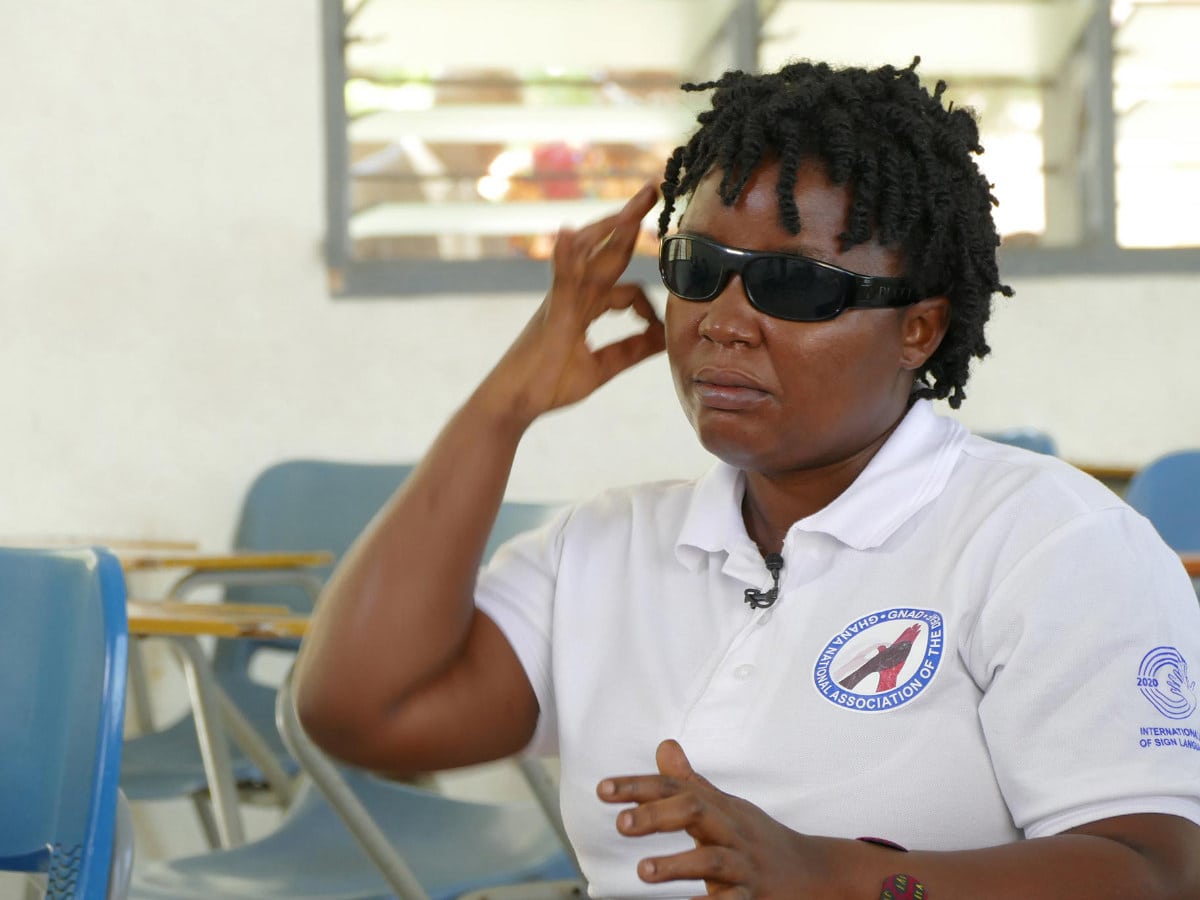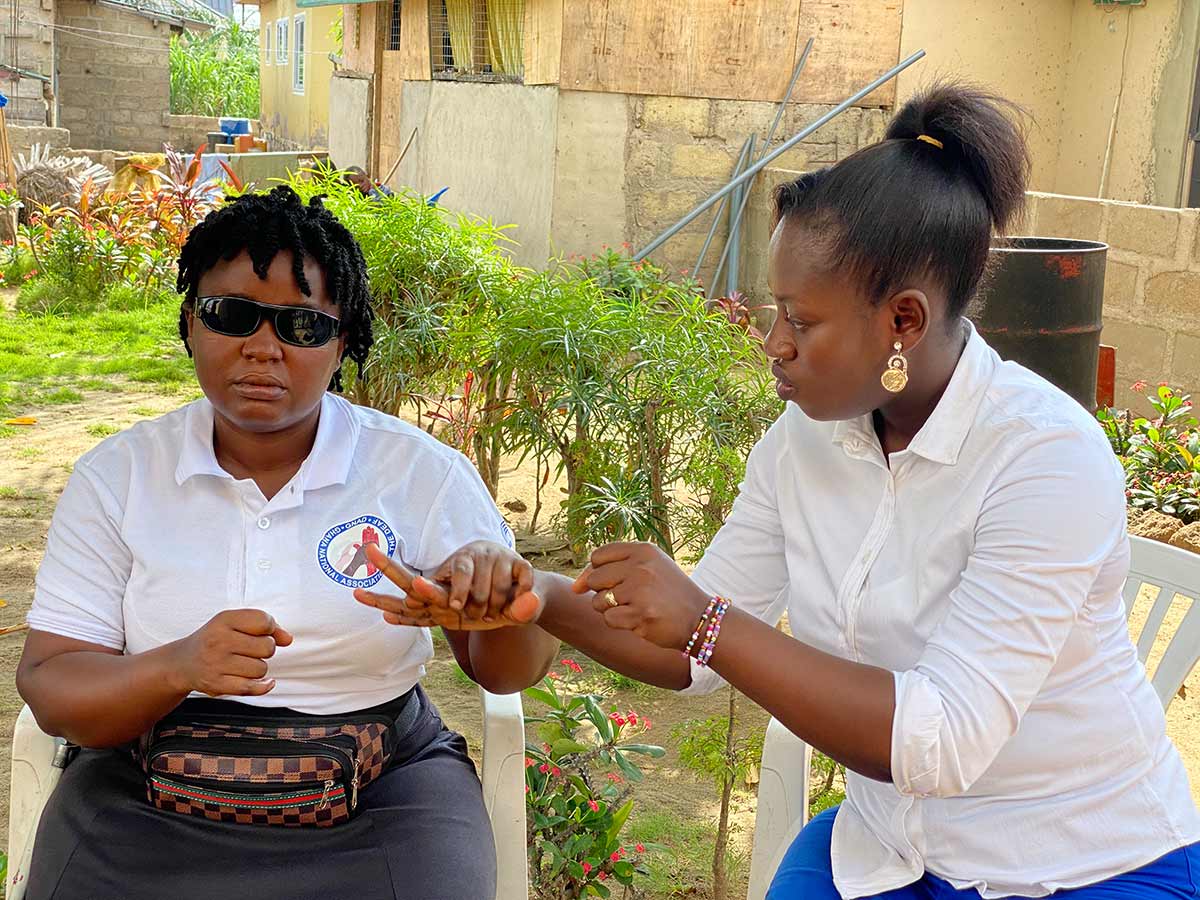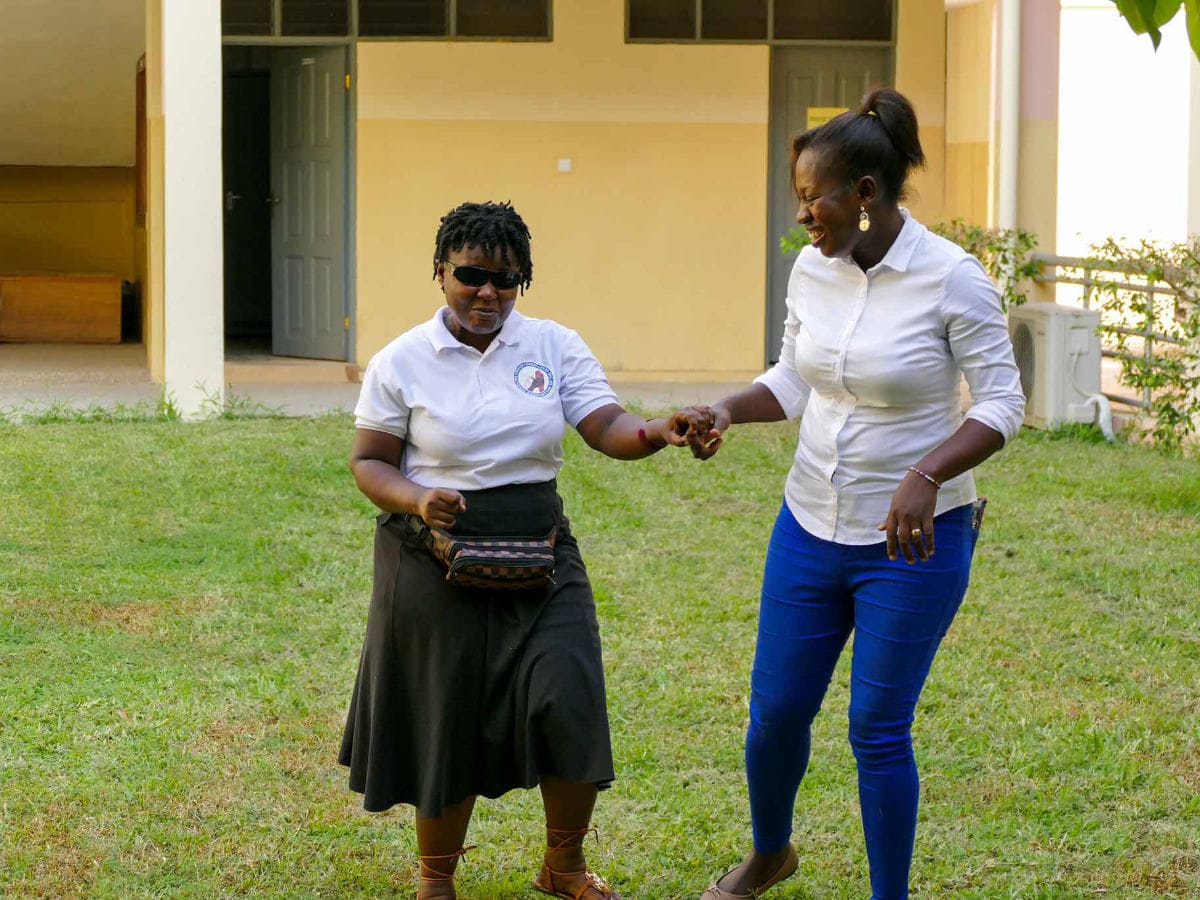
“Look what I have achieved!”
Sylvia Abena Peprah lost her sight and her hearing – and yet she does not let this stop her from following her dreams. An impressive story of what it means to live with multiple disabilities and a young woman who calls for inclusion to be seen as an opportunity.
When Sylvia Abena Peprah receives her diploma from the University of Education Winneba at the end of 2018, there is one thing that sets her apart from the 16,000 other graduates of that year: The now 32-year-old Ghanaian is the first person with visual and hearing impairments to graduate from a university in Ghana – and she did so with distinction.
The University of Winneba considers itself an inclusive institution and admits students with different disabilities every year. In addition, the university employs professionals who are specialised in the different needs of the students. This is not only outstanding for Ghana – there are only a few universities worldwide that enable persons with disabilities to study without barriers.
The University has recognised Sylvia’s potential and pays for her further studies in Community-Based Rehabilitation and Disability Studies. This has brought her an important step closer to her goal of becoming a teacher. But despite her skills and ambition, it has not always been easy for the young woman.
Stigma and disadvantage are omnipresent
Ghana is one of the first countries to sign the United Nations Convention on the Rights of Persons with Disabilities in 2007. In many areas, however, people with disabilities are still far from equal participation in society. Disabilities are – not only in Ghana – still often associated with stigmatisation, discrimination, and social exclusion.
And it often includes the whole family, as persons with disabilities are often affected by poverty. Parents of children with disabilities often barely get by because they are left alone with the health costs of their children. It is not easy to withstand the financial and social pressure – as Sylvia’s knows all too well. A family acquaintance advised her mother to abandon Sylvia in the river. Her own father threatens the mother with violence. But she stands by her daughter.
Sylvia was not born with a disability. When she was six years old, she lost her hearing due to a childhood illness that is still unidentified. She lip-reads her way through school and lets her classmates help her out when the teacher speaks in a different direction.
“I was always very inquisitive,” Sylvia recalls. “I even skipped a grade when I was four.” But one day at school, Sylvia is praised by her maths teacher. And with the teacher’s praise comes the envy of the other children. As a result, they refuse to give Sylvia the support she needs. Without the help of others, she finds it difficult to follow the lessons.
And the teachers do not offer Sylvia any additional help either; the attitude that persons with disabilities do not have the same abilities as people without disabilities is too widespread. But with the help of her mother Lucy, Sylvia passes the exams.

Sylvia acting in sign language © GIZ / Felix Lohmaier
In addition to hearing, Sylvia gradually loses her sight. At the age of nine, she is deaf and blind. And yet she does not give up. Sylvia makes it to the Mampong Demonstration School for the Deaf, where she finally completes her schooling supported by her mother and grandmother. “We wrote everything on her arm,” Lucy recalls. “That’s how we communicated with her.”
Inclusion as an opportunity and benefit for the whole of society
“Every child is a gift,” says the mother of two today when she thinks back to the hard times her family went through. “Make sure that children with disabilities can participate in society and don’t see them as a burden.” This attitude has paved Sylvia’s way. “I know I can be an inspiration to other persons with disabilities,” says Sylvia. “Look at what I have achieved.”
In fact, there are people in Ghana who wonder how Sylvia managed to do it all without sight or hearing. Gifty Nana Yaa Rockson knows the answer. “It is a false assumption that you can’t communicate with Sylvia”, says the young UEW lecturer, who has also been working as a translator for students with visual impairments since 2018.
The two have become friends, connected by deep affection and, above all, mutual trust. “Sylvia and I speak a special form of sign language.” Although Sylvia cannot see the movement of her hands, she can feel the movements with her entire body. This is because in addition to Braille, both women are also proficient in tactile signing, a unique form of manual communication. “That’s how we talk to each other.”
Tactile sign language
In tactile sign language, a deafblind person places his or her hands on those of the signer. This makes it possible to feel the shape and movement of the signs and to compensate for the lack of facial expressions.

Sylvia and Gifty talking in sign language © GIZ / Felix Lohmaier
For Sylvia, mutual trust is very important. She knows that she can rely on Gifty completely, even when it comes to personal things that she doesn’t want anyone else to know. Gifty not only translates the spoken word, but she also describes Sylvia’s surroundings and the feelings she reads on the faces of Sylvia’s dialogue partners.
COVID-19 has proved to be a major difficulty for Sylvia – because she depends on touch to communicate with others. “I can’t get too close to people because of the risk of infection,” she explains. “It makes me very unhappy.”
One day, the pandemic will be over. But Sylvia will still have to deal with stigmatisation afterwards. The future teacher is prepared for this. “Many of the reservations that exist against persons with disabilities are due to ignorance,” the young woman knows.
She would like to see a society with less fear of contact, where persons with disabilities are perceived as individuals with equal rights. Sylvia and her friend Gifty will continue to work towards this in the future.

Sylvia and Gifty at Winneba Campus © GIZ / Felix Lohmaier